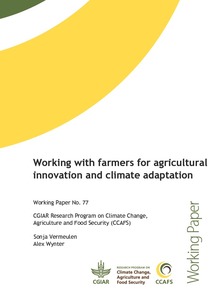West African Sahel and Dry Savannas: Ongoing Activities
Women in Farming
Working with farmers for agricultural innovation and climate adaptation
The CGIAR Research Program on Climate Change, Agriculture and Food Security (CCAFS), in common with other CGIAR research programs, understands that farmers are at the centre of agricultural innovation and adaptation. This publication describes some of the many ways in which CCAFS works with farmers and farmers’ organizations to solve problems generated by climate change.
Workshop for Dryland Systems: ESA Flagships Eveidence-based Transformation
Workshop Objectives
Mapping and modelling the effects of land use and land management change on ecosystem services from local ecosystems and landscapes to global biomes
Herstel en duurzaam beheer van biodiversiteit en ecosysteemdiensten worden steeds meer geïntegreerd in nationaal en internationaal beleid.
Soil organic carbon and nutrient contents are not influenced by exclosures established in communal grazing land in Nile Basin, northern Ethiopia
Land degradation through extensification of agriculture and overgrazing is an increasing problem across large expanses of the Ethiopian highlands that give rise to a loss in a range of ecosystem services.
Nutritional status of pregnant Japanese Black cows grazing on a native pasture
Technique of decrease in radioactive cesium concentration of grass at grassland and pasture
What are the environmental impacts of property rights regimes in forests, fisheries and rangelands?: a systematic review protocol
Rangelands: Conservation and “Land Grabbing” in Rangelands: Part of the Problem or Part of the Solution?
Large-scale land acquisitions have increased in scale and pace due to changes in commodity markets, agricultural investment strategies, land prices, and a range of other policy and market forces. The areas most affected are the global “commons” – lands that local people traditionally use collectively — including much of the world’s forests, wetlands, and rangelands.





